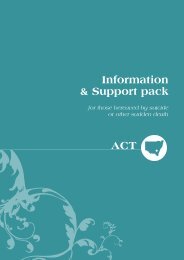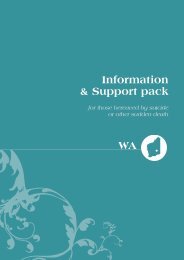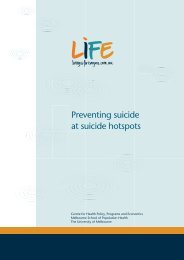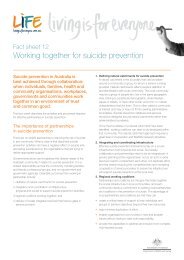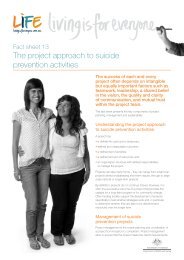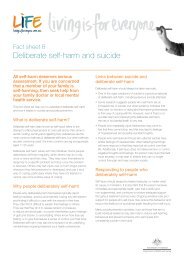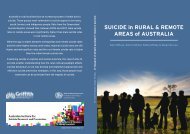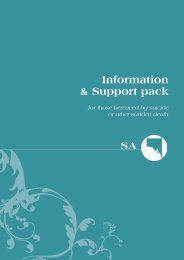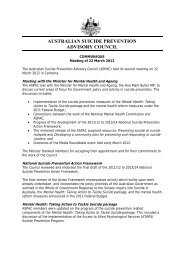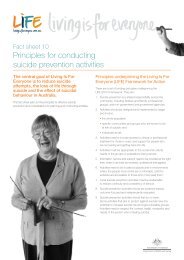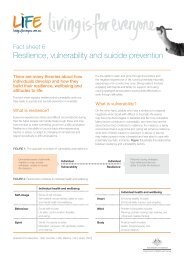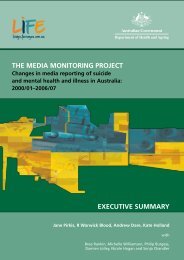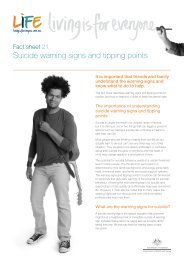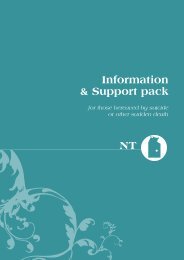Information & Support pack TAS - Living is for Everyone
Information & Support pack TAS - Living is for Everyone
Information & Support pack TAS - Living is for Everyone
- No tags were found...
You also want an ePaper? Increase the reach of your titles
YUMPU automatically turns print PDFs into web optimized ePapers that Google loves.
1 On first being notified1Why are the police involved?The police attend every sudden death. Often they will be in plain clothes instead of a uni<strong>for</strong>m. They will needto ask questions and may talk with you in the next few weeks about the death. Th<strong>is</strong> <strong>is</strong> to help the Coronerdetermine the cause of death. You may need to make a statement which will ass<strong>is</strong>t the Coroner in making adetermination about the nature and cause of the death.Tell the police if you w<strong>is</strong>h to be kept in<strong>for</strong>med of the progress of the investigation and don’t be afraid tocontact them if you are concerned about anything. Alternatively, if you don’t want to be involved, or if youw<strong>is</strong>h to nominate another person as the point of contact, let the police officer know.Where will the body go?Once the police attend the scene of the death they will arrange <strong>for</strong> the body to be taken to the nearestmortuary or regional public hospital.V<strong>is</strong>ual identificationIn most cases the attending police officer and/or the mortuary Ambulance Officer will have a relative orfriend identify the deceased at the place of death. In some instances it will be necessary <strong>for</strong> a deceasedperson to be identified at the mortuary and anyone who knew the deceased well can confirm the identity<strong>for</strong> the Coroner. If you are a close relative and the only person who can do so, you may w<strong>is</strong>h to beaccompanied by a friend.Where it <strong>is</strong> necessary <strong>for</strong> the deceased to be identified at the mortuary, the officers concerned willendeavour to minim<strong>is</strong>e the unsettling effects as much as possible.A suitable time and place <strong>is</strong> set <strong>for</strong> identification by arrangement or at the request of the Coroner’s Office. It<strong>is</strong> helpful if the identifying person attends with details of the deceased noted down, such as, full name andaddress, date of birth, place of birth, marital status, number and sex of any children and parents’ names.You can call the Coroner’s Office to find out what has happened to any of the deceased’s property. TheCoroner may need to hold on to the deceased’s property until the completion of the investigation.What happens in a post mortem?The Coroner may instruct the <strong>for</strong>ensic patholog<strong>is</strong>t to conduct a post mortem examination (autopsy). Th<strong>is</strong><strong>is</strong> an external and internal inspection of the body, which ass<strong>is</strong>ts in finding the medical cause of death. Anautopsy will normally be ordered by the Coroner if a medical practitioner will not <strong>is</strong>sue a medical certificateas to the cause of death.It <strong>is</strong> normal <strong>for</strong> the patholog<strong>is</strong>t to retain blood and or t<strong>is</strong>sue <strong>for</strong> examination. However, in some cases wholeorgans are retained <strong>for</strong> further examination to determine or confirm the cause of death. Th<strong>is</strong> can take severalweeks to complete and could affect funeral arrangements. Any concerns you have in th<strong>is</strong> area should bed<strong>is</strong>cussed with your funeral director, Coroner’s Officer or grief counsellor.Once the post mortem <strong>is</strong> completed, a detailed report <strong>is</strong> prepared <strong>for</strong> the Coroner. It outlines the medicalfindings and conclusions. When the report <strong>is</strong> available the important conclusions are set out in a letter sentto the family.The senior next-of-kin may object in writing to an autopsy being per<strong>for</strong>med. The objection must be made assoon as possible after death. If an objection <strong>is</strong> being considered telephone contact should be made with theCoroner’s Office immediately no matter what time of the day or night. Staff will be able to adv<strong>is</strong>e you of yourrights and obligations in relation to th<strong>is</strong>.The Coroner’s staff will be in touch with you as soon as there <strong>is</strong> something to report, initial investigations arecomplete and the body <strong>is</strong> available <strong>for</strong> the funeral. Attending police officers will provide the Coroner’s staffwith the name of the senior next-of-kin. In most circumstances the Coroner’s staff will deal with th<strong>is</strong> person.3



